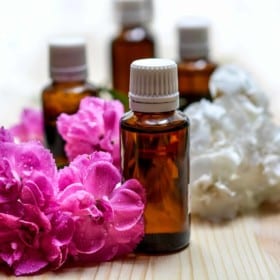We all know that foliage looks fantastic and adds a touch of greenery to our homes. But, do plants in the bedroom help you sleep? Let’s find out…
Imagine a peaceful, organic bedroom. The chances are you think of things like natural fibres in your bedding that help to reduce allergic reactions to synthetic materials and ensure your body can breathe.
Everything from your choice of pillows, to the decisions you make regarding your sleep schedule, will impact the quality of rest you get. The right bedroom environment is often key to success.
An environment that’s cosy, welcoming, and packed full of comfort is far more conducive to sweet dreams. One of the best things you can do to improve your chances of sleep success is to leave plenty of space aside for plants in the bedroom.
Filling your bedroom with the right foliage is an excellent way to transform your room into an oasis of comfort and calm. Plants help us to relax, reminding us of the great outdoors, where we can escape the stresses of an industrial life.
The right flowers also purify the air, replenish oxygen, and give you a lovely fresh scent to fall asleep to.
Here’s everything you need to know about plants that help you sleep.
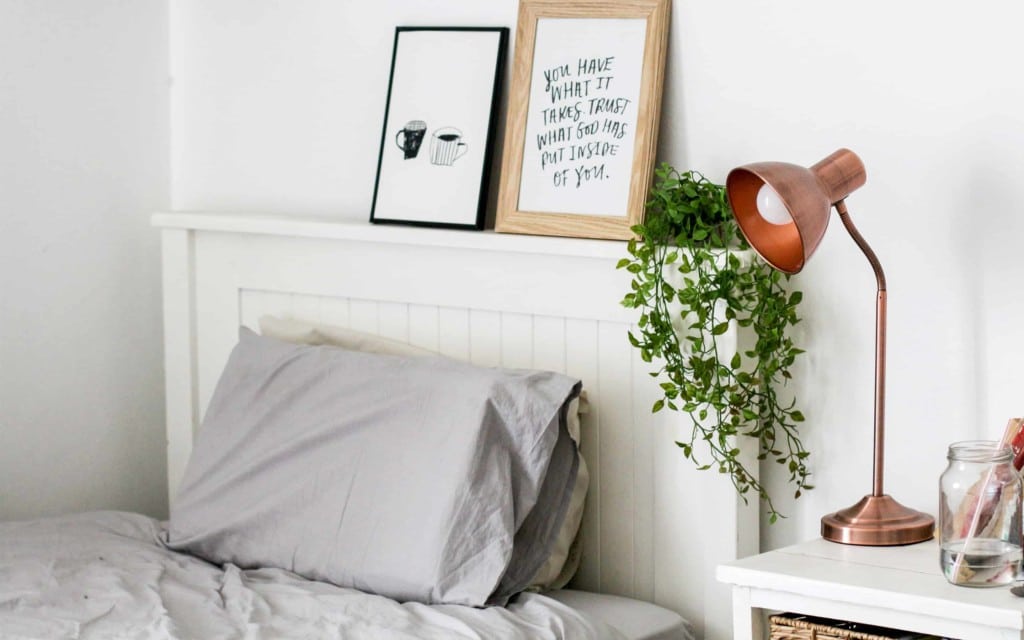
Fantastic foliage: Do plants in the bedroom help you sleep?
So, do plants help you sleep? And, what are the benefits of using plants for sleep?
Well, as you might have guessed, it all starts with the way that plants affect your oxygen intake. There’s no disputing the fact that plants are excellent air purifiers. They naturally filter out volatile organic compounds (VOCs) that can leave you feeling terrible, and they produce oxygen too.
Plants are so effective at improving the quality of your air that they even help patients recover more rapidly after a surgery or illness according to medical professionals.
Experts even recommend placing living plants into the rooms of patients with terminal illnesses to improve their wellbeing.
Although it’s also true that plants emit carbon dioxide more frequently during the night, this is unlikely to counteract their oxygenation benefits, particularly in larger bedrooms.
According to studies from Indiana, the amount of oxygen that bedroom plants use at night still outshines the amount of carbon dioxide they produce.
Some Feng Shui fans are convinced that placing too much living energy in the form of plants in the bedroom space can counteract the kind of atmosphere you want to create for sleeping.
However, there are other professionals out there that say plants with relaxing scents like jasmine or lavender could be beneficial to your sleep pattern. Mostly plants in your bedroom are regarded helpful particularly because of their impact on the living energy in your sleep space.

Sensational scents: Plants for aromatherapy
Do plants make you sleep better, then?
Well, that all depends on who you ask. If we look at plants in the bedroom from an aromatherapy perspective, then it’s clear to see that there are some obvious advantages.
There are more than enough scientific studies out there that show us that the right scents can change how we feel at night.
Remember, smells are processed through the limbic system, which has a direct impact on things like memory, motivation, and emotional experience.
Through the centuries, orange oil has been used to alleviate depression and anxiety, while jasmine is comforting and ylang ylang is considered an aphrodisiac.
Choose a house plant for your bedroom that releases the right scents into the air, and you can benefit from a complete overhaul in your mood. That’s particularly useful when you consider the fact that stress and anxiety are some of the most common reasons for insomnia.
Some of the best-smelling plants in the bedroom for inducing sleep include:
Lavender
Probably the plant best associated with sleep thanks to its relaxing scent. Lavender blossoms well during the summer. What’s more, you can dry lavender out and create wonderfully scented oils with it too, so you can enjoy the benefits all year long.
Scientists from the University of Southampton found that people who used lavender oil in their bedroom ranked their quality of sleep 20% higher than their counterparts.
Jasmine
With its beautiful white and yellow flowers, the scent of jasmine is an easily recognisable and highly popular one for many people.
According to research from the University of West Virginia in the USA, people who sleep in a room scented with jasmine are more likely to sleep peacefully than people sleeping in a control room, or even a lavender-scented room.
Additionally, the people with jasmine in their bedrooms performed better on mental functioning tests when they woke up.
Gardenia
Another stunning houseplant that’s sure to work well in any bedroom, gardenia is excellent for improving your rest pattern. Although it requires a little more maintenance, this plant has natural sedative properties thanks to its alluring scent.
When it comes to plants that help you sleep, choosing a flower that looks pretty in your bedroom and fills the space with a naturally relaxing scent is a great way to boost your chances of battling insomnia.
Just make sure that the scent isn’t so overwhelming that it distracts you or wakes you up with a headache during the night.
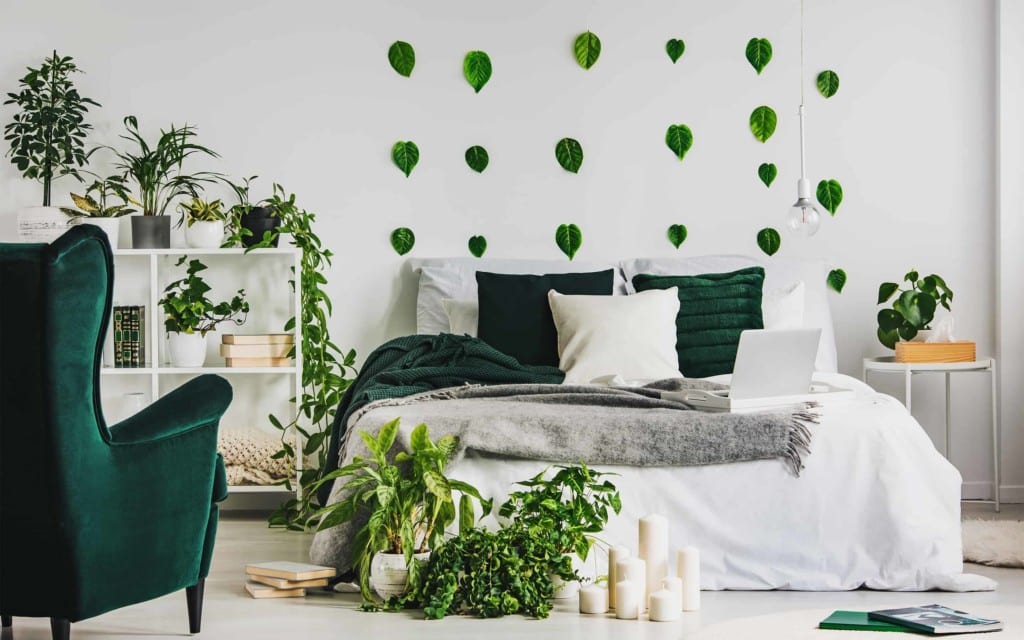
Why should you put plants in your bedroom?
We’ve covered one of the most obvious answers to “Why should you put plants in your bedroom” already — they smell amazing. However, there are also other reasons why you might want to fill your home with foliage, if you struggle with sleep issues.
For instance, studies clearly show that interacting with nature help us to reduce our stress levels. If stress and an inability to wind down at night is keeping you awake, bringing nature indoors is sure to help. Here are some other reasons why you should fill your bedroom with plants.
1. Plants improve the air quality
Aside from the relaxing scent that plants give off, one of the most commonly-cited reasons for using plants for sleep is that they help to improve air quality. It is well known that the aloe vera plant produces oxygen at night.
According to a range of studies, flowers and plants enhance the air quality in your home by eliminating chemicals and volatile organic compounds and filling your rooms with additional oxygen.
As they respire throughout the day, the plants in your bedroom will naturally filter the air that you breathe — creating better results than any air filter you can buy.
Additionally, it’s worth noting that plants can also help to increase humidity. This is valuable because air that’s too dry often leads to various respiratory problems, including sore throats and coughing during the night.
2. Plants reduce noise pollution
Thanks to their ability to filter the air, plants are excellent at getting rid of some of the common air pollution that damages your indoor (and even outdoor) environment.
However, what you may not realise is that your plants can also help to cut down background noise too. Studies tell us that certain indoor plants are effective at diffracting and absorbing the noise that tries to enter your bedroom through your windows.
Some plants help you sleep and are capable of reducing ambient noise by anywhere up to 5 decibels. That might not seem like a lot, but it could be just enough to stop you from needing any extra
3. Plants improve mental wellness
As we mentioned above, plants have a fantastic impact on your mental wellbeing. Over the years, countless scientists have explored the benefits that the great outdoors can have on our mind.
Not only do the right plants speed up the recovery time of hospital patients, but they also help us to feel better about things in our daily life.
Even if you don’t identify as a flower or plant enthusiast, you’re sure to be affected by exposure to nature on a subconscious level.
Studies have found out that the brain automatically responds to things like a particular shape, colour, or scent.
According to one study from the Royal Agricultural University, there’s a link between the presence of indoor plants and improved concentration too. Students placed in a room with plants were 70% more focused.
4. Plant extracts can eliminate congestion and insomnia
Aside from just benefiting from having plants in your bedroom, there are also other ways to soak up the many advantages of plants.
For instance, compounds in particular plants can lead to health-promoting qualities, as well as anti-insomnia benefits. Plenty of people swear by taking supplements that help them to enjoy a better quality of sleep.
Eucalyptus, for instance — the favourite food of koala bears, is excellent for giving you a healthy respiratory system. When your sinuses are clear, and you can breathe easy, enjoying a great night of sleep isn’t nearly as tough.
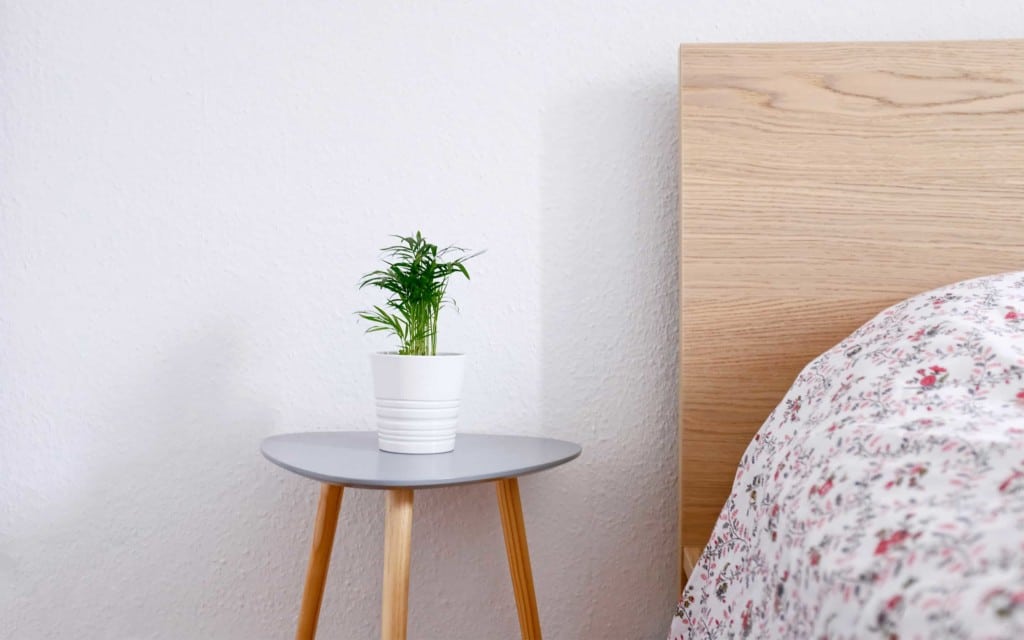
Is there a downside to having plants in the bedroom?
With so many clear benefits associated with using plants for sleep, you might be wondering if there are any downsides to bringing flowers and other plants into your bedroom.
Once again, this will depend on who you ask. While some people believe that plants are by far one of the best sleep aids anyone can invest in, others feel that despite their benefits, plants belong outside of the bedroom.
For example, one issue people have with using plants for sleep is that they need regular water and fresh soil to thrive.
This can sometimes lead to the occasional mess if you accidentally knock a pot over when you’re sleeping. When figuring out where to place your plants, think carefully about whether you’re likely to hit them when tossing and turning at night. Other issues include:
Dangers to pets
Another reason why you might want to avoid keeping plants in your bedroom, is if you have pets that could easily start munching on the plants or stems.
There are some varieties of houseplant that are recommended for great sleep that can also be dangerous to dogs and cats. Lilies are poisonous to our feline friends. If you are planning on using plants to improve your sleeping patterns, make sure that you do your research first.
Problems with Feng Shui
What’s more, as we mentioned above, there are a few people in the Feng Shui community that argue against the concept of using plants in the bedroom. Since plants have a lot of living energy to exude into a room, they can detract from the relaxing atmosphere that you’re trying to create.
Carbon dioxide
Plants also create carbon dioxide at night — which is bad for us. Photosynthesis, which converts carbon dioxide into oxygen, doesn’t happen during the night, because of the lack of sunlight. Make sure that you have a big enough bedroom to diffuse the effects of extra CO2 in your bedroom in an evening.
What is the best plant to have in your bedroom?
Although plants won’t help everyone to sleep better, they do have a lot of benefits that are worth being aware of. According to a study conducted by NASA in 1989, they’re excellent for purifying the air, which helps you to breathe easy as you rest.
Additionally, studies find that certain plants are excellent at improving mood and banishing stress too.
Whether you’re hoping that your new plants will help with tackling issues with indoor air quality, or you’re just looking for a sensational scent to improve your mood at night, it’s worth noting that some plants for sleep are more effective than others.
Here are some of the most commonly recommended “best plants” to have in your bedroom.
1. English ivy
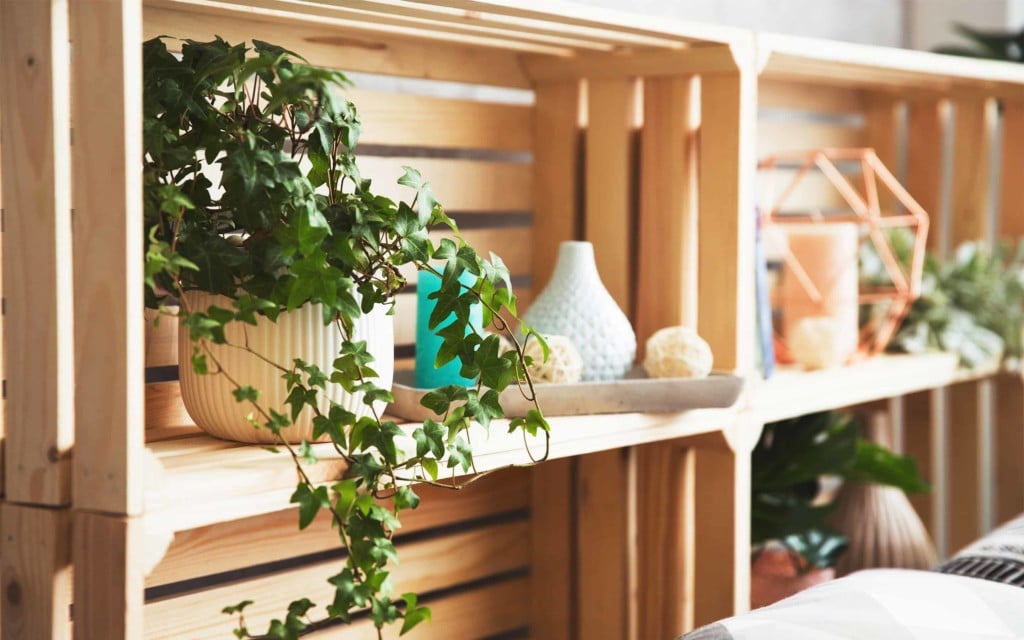
English ivy is an attractive, low-maintenance house plant that makes an ideal bedroom companion. Not only can it clean the indoor air perfectly, but it’s also well-suited to thriving in low temperature and low light environments too.
2. Chinese evergreens
According to a study by the Journal of Physiological Anthropology, Chinese evergreens are brilliant at removing indoor pollutants.
According to the researchers in the study, guiana chestnut, weeping fig, and aglaonema brevispathum were all fantastic at getting rid of pollutants in a room when placed next to a window.
3. Snake plant
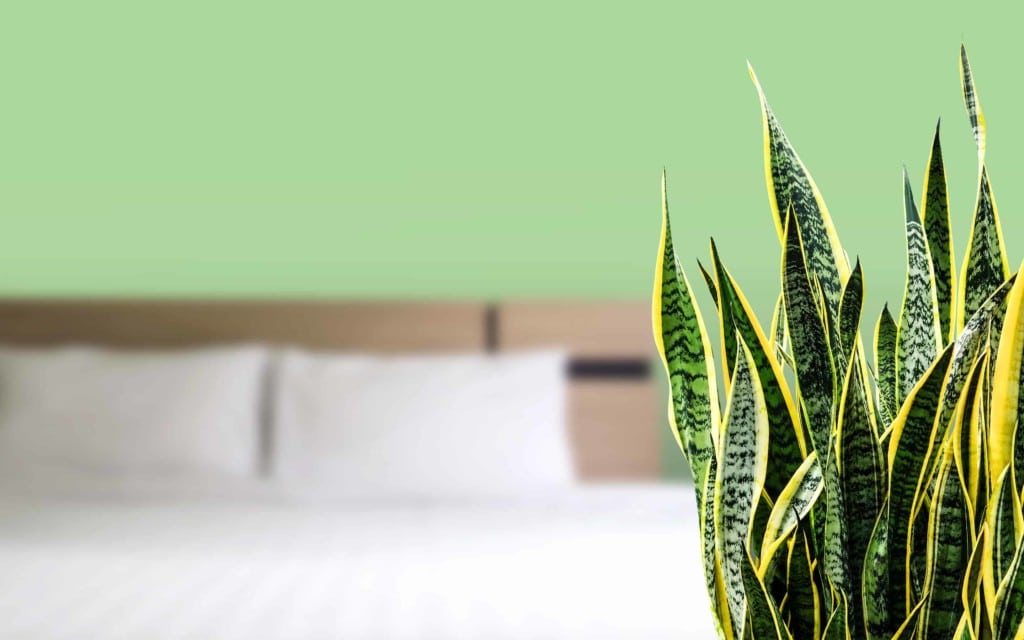
Another common plant to find in either a home or office environment, Snake plants are low-maintenance foliage that thrives inside or outside of the home.
In one article written for the United Nations, researchers discovered that the snake plant can absorb a range of hazardous chemicals often found within indoor environments.
4. Peace lily
Make sure that you don’t opt for the peace lily if you have a cat that could accidentally chew on the plant, as they are poisonous to felines.
However, these flowers are excellent for human beings. As a bedside companion, a lily looks and smells amazing. What’s more, the Plants and Environmental Quality Group found that peace lilies are great at removing toxins in the air, thriving in shady environments without any problems.
One study even found that patients recovering from abdominal surgery healed faster when they were exposed to peace lilies
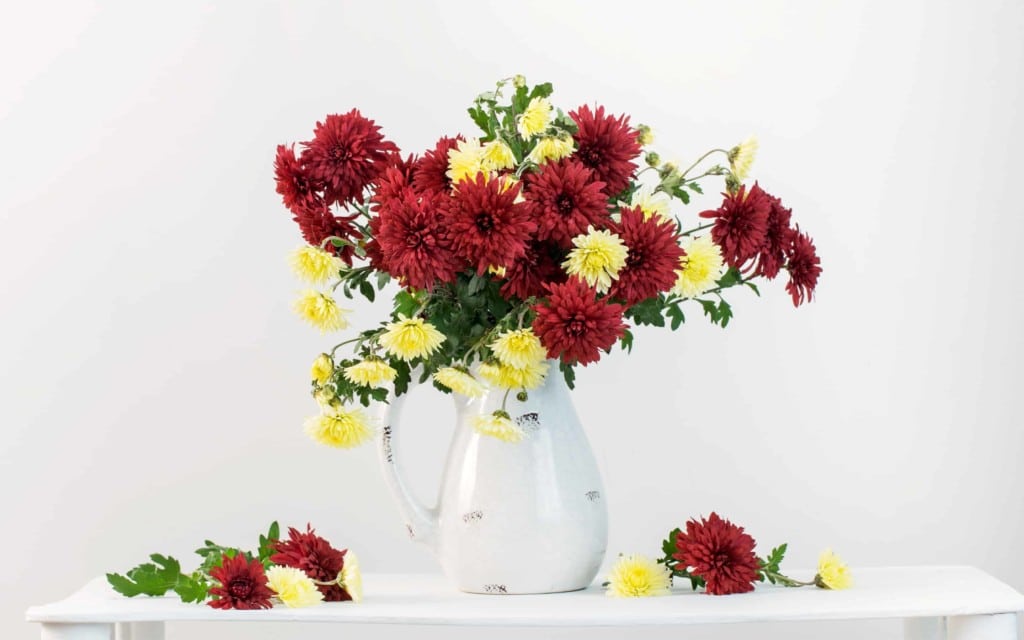
5. Chrysanthemum
The chrysanthemum plant was officially recommended by the scientists over at NASA for people asking, “what is the best plant to have in your bedroom.”
That must mean that it’s worth a try. These flowers are excellent at purifying the air around your bedroom and filtering out unwanted toxins.
Additionally, when it comes to choosing plants for sleep, the chrysanthemum also lives well in environments with low light, which means that you don’t have to keep it on the windowsill
Tips on using plants for sleep: Building a bedroom oasis
Your bedroom should be an oasis that you can rely on for relaxation and comfort. When you want to escape from the outside world, your bed can give you a place of peace and tranquility like no other.
For many people, the bedroom is usually the best room in the house. Get your bedroom atmosphere right, and you’ll notice that your health begins to improve in several different ways.
A well-designed bedroom that encourages relaxing and restful sleep gives you everything you need to start the day right and end it properly.
To create your green haven, make sure that you spend some time researching the plants that are best-suited to your rooms, and follow these tips on using plants for sleep.
Choose the right kind of plants
There are many different species of plant on earth today. Most experts say that there are around 391,000 vascular plant species alone. The right option for you will depend on how much care and time you can devote to your plants, as well as what kind of appearance and scent you’re drawn to.
Additionally, it’s worth noting that snake plants, succulents and orchids are also better at continuing to emit oxygen during the night.
Avoid too much sun
Remember that most indoor plants don’t thrive well when exposed to the midday sun, so it’s worth keeping that in mind when you’re deciding where to place your plants.
When choosing the best location for your plant, make sure that you consider their light needs carefully, and make sure that the plant isn’t close enough to your bed that a wayward arm or leg could knock the pot onto the floor.
Some plants like it hot
Just as certain plant species require more light than others, some plants also need hotter environments.
Since it’s important to keep your bedroom cool for sleep hygiene purposes, it’s important to determine what kind of care your plant needs before you invest in one for your bedroom. Don’t choose something that requires too much of a hot or humid environment.
It’s also worth making sure that everyone in your home is comfortable with having plants around. If someone in your family has issues with pollen, then it’s probably not a good idea to force them to be exposed to plants at all times of the day. You can always look for a plant that’s well-suited to people with allergies, however.
It may surprise you to learn that exposing your children to plenty of plants during their younger years can help to reduce the risk that they’ll end up suffering from hay fever and other pollen-related allergies later on.
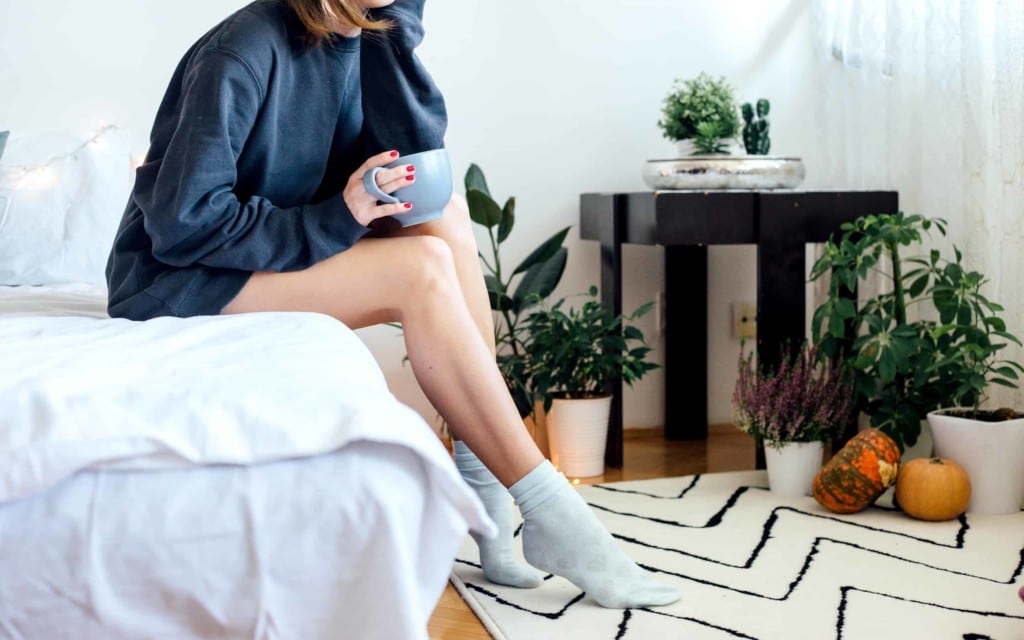
Do plants make you sleep better? The verdict
So, do plants help you sleep?
When it comes to addressing sleep issues, there’s no one-size-fits-all cure that works for
However, if you’re looking for a way to spruce up your bedroom, and potentially enhance your sleep pattern at the same time, then it might be worth investing in a few plants for sleep.
The right plants in your bedroom will clear your atmosphere, make sure you’re always breathing the highest quality of air, and even reduce the amount of time that it takes for you to get to sleep.
If you’re not good with plants in your bedroom, you can still take advantage of their benefits by experimenting with aromatherapy and plant extracts too.
Like with most solutions intended to ensure better sleep, making the most of plants will often be a trial and error experience.
If you try bringing a plant into your bedroom and discover that it doesn’t help you to sleep, or that it makes your sleeping patterns worse, then you can always give the item away as a gift. Plants always make a great present, after all.
Siestio. Sleep Matters.
General advice disclaimer
This article contains general tips and advice. However, no diet or exercise program should be started without consulting your physician or other industry professional first. For more information read our full disclaimer here.


